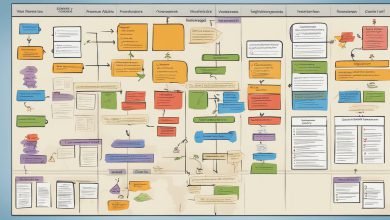
Effective leadership is crucial to the success of any team, but what sets great leaders apart? The answer lies in trust. Trust is the foundation upon which strong teams are built and great leaders are made. Without trust, teams lack the necessary collaboration, innovation, and commitment needed to achieve their goals.
In this article, we’ll explore the role of trust in team leadership and how it can drive high-performance teams. We’ll also discuss practical strategies for building trust within teams and the importance of cultivating trustworthy leaders.
Key Takeaways:
- Trust is the cornerstone of effective team leadership.
- Trust affects team dynamics, collaboration, and overall performance.
- Building trust requires open communication, transparency, accountability, and leading by example.
- Cultivating trustworthy leaders is essential to driving successful team leadership.
The Role of Trust in Effective Team Leadership
Trust is a foundational element of effective team leadership. Teams that work together in an environment of trust are more likely to be productive, innovative, and successful. Trust is the glue that holds teams together, enabling them to collaborate and perform at their best.
The importance of trust in team leadership cannot be overstated. Trust is essential for building strong relationships between team members and establishing a culture of teamwork. It allows team members to communicate openly and honestly, share ideas and feedback, and work towards common goals.
Trust also plays a vital role in team building. When team members trust each other, they are more likely to support each other, be accountable for their actions, and work towards shared objectives. Trust enables teams to navigate conflicts and challenges effectively, leading to better outcomes and a more cohesive team dynamic.
The Impact of Trust on Team Performance
Research has shown that trust is a key predictor of team performance. Teams that have high levels of trust experience better communication, greater collaboration, and higher levels of innovation. Trust also enhances team members’ commitment to their work, leading to greater job satisfaction and a more positive work environment.
Effective team leadership means prioritizing trust in team building efforts. Leaders must model trustworthy behavior, establish clear communication channels, and foster an environment of transparency and accountability. By cultivating trust within teams, leaders can create a foundation for success and drive high-performance teamwork.
The Importance of Trust in Team Building
Trust is critical for effective team building. It enables team members to have faith in each other’s abilities, respect each other’s opinions, and work collaboratively towards achieving common goals. When teams are built on trust, they are more likely to be resilient, adaptable, and able to tackle complex challenges.
Leaders who prioritize trust in team building efforts create an environment where team members feel valued and supported. This fosters a sense of belonging and encourages team members to strive for excellence. By focusing on building trust within teams, leaders can create a strong foundation for successful teamwork, driving greater innovation and achieving better outcomes.
Building Trust in Teams: Strategies and Best Practices
Effective team leadership requires a foundation of trust. Building trust within teams can be challenging, but there are strategies and best practices that leaders can implement to foster a culture of trust and open communication.
1. Open Communication
Open communication is essential for building trust within teams. Leaders should encourage open dialogue between team members and provide opportunities for feedback. When team members feel heard and understood, they are more likely to trust one another and work collaboratively towards common goals.
Tip: Schedule regular team meetings to discuss progress and address any concerns that team members may have. Encourage team members to share their thoughts and ideas, and make sure that everyone has the opportunity to speak.
2. Transparency
Transparency is another key factor in building trust within teams. Leaders should be transparent in their decision-making processes and communicate openly about project goals and expectations. When team members understand the reasoning behind decisions, they are more likely to trust their leaders and feel invested in the success of the project.
Tip: Create a project timeline and share it with the team. Be transparent about deadlines and project milestones, and provide regular updates on progress towards these goals.
3. Accountability
Leaders should encourage accountability within teams to build trust and foster a sense of ownership. When team members take ownership of their work and hold themselves accountable for their actions, they are more likely to trust one another and work collaboratively towards project success.
Tip: Hold team members accountable for their work by setting clear expectations and providing regular feedback. Encourage team members to take ownership of their work and hold themselves accountable for meeting project goals.
4. Leading by Example
Leaders should lead by example to build trust within teams. When leaders model trust and accountability, team members are more likely to follow suit and work collaboratively towards project success.
Tip: Model trust and accountability by following through on commitments, admitting mistakes, and seeking input from team members. When leaders lead by example, they create a culture of trust and collaboration within their teams.
By implementing these strategies and best practices, leaders can build trust within their teams and foster a culture of open communication, transparency, accountability, and collaboration. When trust is the cornerstone of team leadership, teams are better equipped to innovate, perform at a high level, and achieve project success.
Leadership Development: Cultivating Trustworthy Leaders
Building trust within teams requires leaders who prioritize trust and lead with integrity. However, becoming a trustworthy leader is not a trait that comes naturally to everyone. It requires ongoing development, training, and practice.
Effective leadership development programs prioritize the importance of trust in team building and focus on cultivating leaders who can instill trust in others. These programs provide training on how to establish open communication, lead by example, and hold oneself accountable.
| Leadership Development Strategies | Key Benefits |
|---|---|
| Proactively seeking and promoting individuals who value trust and integrity | Building a culture of trust and transparency within the team |
| Providing ongoing training and development on emotional intelligence and communication skills | Equipping leaders with the necessary tools to communicate effectively and build relationships based on trust |
| Offering mentorship and coaching programs to develop and refine leadership skills | Providing opportunities for leaders to learn from more experienced leaders and receive personalized feedback on their leadership style |
Leaders who prioritize building trust are more likely to foster an environment that encourages innovation, collaboration, and high performance. Trustworthy leaders inspire loyalty and commitment from their teams, leading to increased motivation, engagement, and overall job satisfaction.
By investing in leadership development programs that prioritize trust and integrity, organizations can cultivate effective leaders who prioritize trust and empower teams to reach new heights of success.
Conclusion
In conclusion, trust is undeniably the cornerstone of effective team leadership. As highlighted in this article, the importance of trust cannot be overstated when it comes to fostering collaboration, building strong and cohesive teams, and ultimately driving high performance. From exploring the role of trust in team dynamics to discussing practical strategies for building trust within teams, this article has provided valuable insights for leaders looking to cultivate trust and lead with integrity.
It is crucial for organizations to prioritize leadership development and invest in programs that nurture trustworthy leaders. By selecting and developing leaders who prioritize trust and lead by example, organizations can create a culture of trust that not only benefits teams but also the entire organization.
It is our hope that this article has provided actionable tips and techniques to help leaders build trust within their teams. By prioritizing trust and transparency, leaders can create an environment where team members feel empowered to collaborate, innovate, and drive success. Remember, trust is not built overnight, but with patience, persistence, and a commitment to open communication, leaders can cultivate trust and unlock the full potential of their teams.
FAQ
Q: Why is trust considered the cornerstone of effective team leadership?
A: Trust is considered the cornerstone of effective team leadership because it establishes a foundation of mutual respect and open communication. When team members trust their leader, they are more likely to feel comfortable sharing ideas, taking risks, and collaborating openly. This fosters a positive team dynamic and allows for greater innovation, productivity, and overall success.
Q: How does trust affect team dynamics and collaboration?
A: Trust plays a crucial role in team dynamics and collaboration. When team members trust each other, they are more likely to work together harmoniously, share responsibilities, and support one another. Trust encourages open communication, idea-sharing, and constructive feedback, leading to stronger teamwork and increased productivity.
Q: What are some strategies for building trust within teams?
A: Building trust within teams can be achieved through strategies such as open and honest communication, transparency in decision-making processes, accountability for actions, and leading by example. Encouraging teamwork, fostering a positive work environment, and recognizing and valuing individual contributions also contribute to building trust within teams.
Q: How does leadership development contribute to cultivating trustworthy leaders?
A: Leadership development plays a crucial role in cultivating trustworthy leaders. By investing in leadership training and development programs, organizations can help leaders enhance their skills, values, and behaviors that are essential for building trust within teams. Leadership development focuses on selecting and nurturing leaders who prioritize trust, integrity, and ethical behavior, thereby setting the foundation for a trustworthy and effective team leadership.








